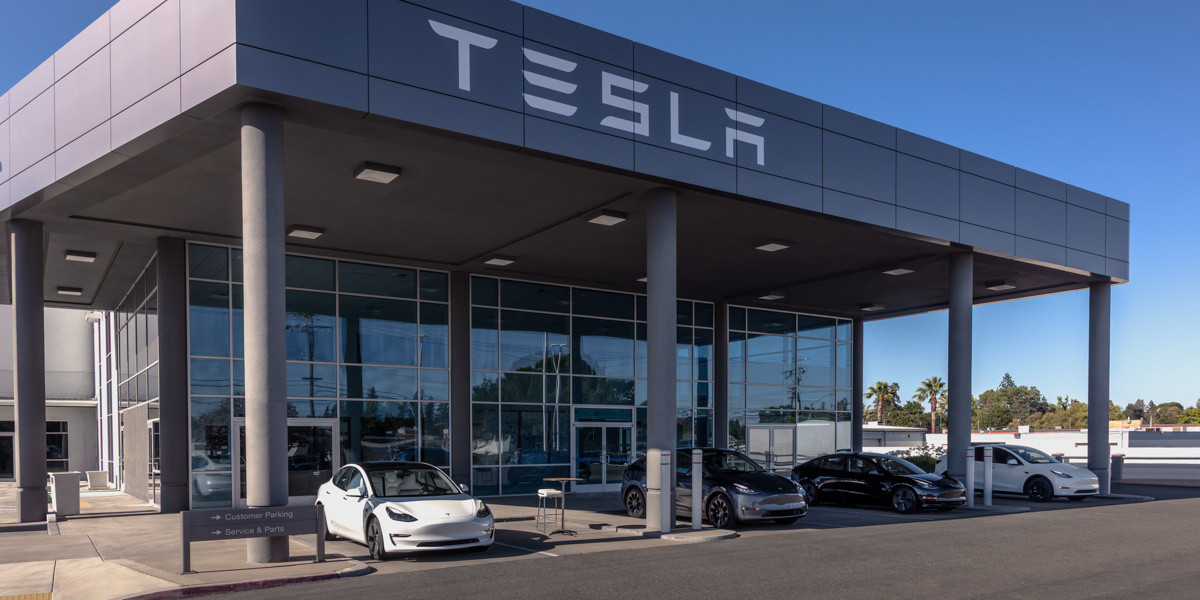Tesla and other companies selling vehicles directly to consumers are under threat in Florida, where two bills may disrupt how the automakers sell their vehicles.
Tesla has become intimately familiar with the laws surrounding dealerships and auto sales throughout the United States, often putting the American upstart at odds with local government and dealerships alike. Now, Tesla is again facing threats from legislatures as two new bills could derail the company’s sales system in Florida.
Currently, there are no restrictions on direct-to-consumer sales in Florida. According to the National Conference of State Legislatures, Florida Statute 320.645, “manufacturers may engage in direct-sales of motor vehicles provided there are no franchised dealerships selling such vehicles within the state.”
However, this could change.
As initially reported by Seeking Rents, Florida House Bill 637, sponsored by Rep. Jason Shoaf, and Florida Senate Bill 712, sponsored by Sen. Bryan Avila, are set to prohibit automakers from selling vehicles direct to consumer, preventing automakers from reserving vehicles for customers, and restricting automakers from incentivizing or forcing dealers to sell certain types of vehicles, including EVs.
Neither Bill has made its way to voting, and both have received substantial amounts of editing thus far, but as it stands, the current abstracts for the bills are listed below:
HB637: “Prohibits manufacturer, distributor, or importer from certain actions in allocation or distribution to franchised motor vehicle dealers; authorizes sale or activation of accessories or features through remote electronic transmission; revises provisions prohibiting manufacturer, distributor, or importer from owning, operating, or controlling motor vehicle dealership; authorizes application for injunction; authorizes motor vehicle dealer association to seek declaration & adjudication of rights with respect to certain violations.”
SB712: “Motor Vehicle Sales; Prohibiting applicants and licensees from reserving a certain motor vehicle for a specifically named person; prohibiting applicants and licensees from requiring or incentivizing motor vehicle dealers to sell or lease particular motor vehicles to specifically named persons or at specific prices or profit margins; prohibiting applicants and licensees from engaging in certain activities of motor vehicle dealers; authorizing specified entities without independent franchised dealers in this state to own, operate, or control a motor vehicle dealership in this state, etc.”
According to the lobbyists listed in association with the Bill on the Florida State Legislature website, both bills have received sizable backing from dealers and dealership groups, including the AutoNation dealership chain, the Florida Association of Automotive Dealers, and the South Florida Association of Automotive Dealers.
Neither state representative was immediately available for comment to Teslarati on the upcoming bills.
It is essential to recognize that Tesla would not be the only automaker affected by these bills. As seen in the second section of SB712, the Bill would prohibit “applicants and licensees” from requiring or incentivizing the sales of electric vehicles, which is precisely what brands like Ford, Hyundai, and General Motors have been doing nationally.
Furthermore, the Bill would prohibit automakers from intervening in the pricing of their vehicles, allowing dealers to dramatically mark up vehicles, a problem that has plagued numerous legacy automakers.
Considering how early in the lifecycle of both these bills are, there is a good chance they look very different by the time they reach the voting stage. However, with both of these bills up for voting in the coming weeks or months, there is no doubt that Tesla may face new legal pressure in the State of Florida if it hopes to continue to sell directly to customers.
What do you think of the article? Do you have any comments, questions, or concerns? Shoot me an email at william@teslarati.com. You can also reach me on Twitter @WilliamWritin. If you have news tips, email us at tips@teslarati.com!
News
Tesla launches in India with Model Y, showing pricing will be biggest challenge
Tesla finally got its Model Y launched in India, but it will surely come at a price for consumers.

Tesla has officially launched in India following years of delays, as it brought its Model Y to the market for the first time on Tuesday.
However, the launch showed that pricing is going to be its biggest challenge. The all-electric Model Y is priced significantly higher than in other major markets in which Tesla operates.
On Tuesday, Tesla’s Model Y went up for sale for 59,89,000 rupees for the Rear-Wheel Drive configuration, while the Long Range Rear-Wheel Drive was priced at 67,89,000.
This equates to $69,686 for the RWD and $78,994 for the Long Range RWD, a substantial markup compared to what these cars sell for in the United States.
🚨 Here’s the difference in price for the Tesla Model Y in the U.S. compared to India.
🚨 59,89,000 is $69,686
🚨 67,89,000 is $78,994 pic.twitter.com/7EUzyWLcED— TESLARATI (@Teslarati) July 15, 2025
Deliveries are currently scheduled for the third quarter, and it will be interesting to see how many units they can sell in the market at this price point.
The price includes tariffs and additional fees that are applied by the Indian government, which has aimed to work with foreign automakers to come to terms on lower duties that increase vehicle cost.
Tesla Model Y seen testing under wraps in India ahead of launch
There is a chance that these duties will be removed, which would create a more stable and affordable pricing model for Tesla in the future. President Trump and Indian Prime Minister Narendra Modi continue to iron out those details.
Maharashtra Chief Minister Devendra Fadnavis said to reporters outside the company’s new outlet in the region (via Reuters):
“In the future, we wish to see R&D and manufacturing done in India, and I am sure at an appropriate stage, Tesla will think about it.”
It appears to be eerily similar to the same “game of chicken” Tesla played with Indian government officials for the past few years. Tesla has always wanted to enter India, but was unable to do so due to these import duties.
India wanted Tesla to commit to building a Gigafactory in the country, but Tesla wanted to test demand first.
It seems this could be that demand test, and the duties are going to have a significant impact on what demand will actually be.
Elon Musk
Tesla ups Robotaxi fare price to another comical figure with service area expansion
Tesla upped its fare price for a Robotaxi ride from $4.20 to, you guessed it, $6.90.

Tesla has upped its fare price for the Robotaxi platform in Austin for the first time since its launch on June 22. The increase came on the same day that Tesla expanded its Service Area for the Robotaxi ride-hailing service, offering rides to a broader portion of the city.
The price is up from $4.20, a figure that many Tesla fans will find amusing, considering CEO Elon Musk has used that number, as well as ’69,’ as a light-hearted attempt at comedy over the past several years.
Musk confirmed yesterday that Tesla would up the price per ride from that $4.20 point to $6.90. Are we really surprised that is what the company decided on, as the expansion of the Service Area also took effect on Monday?
But the price is now a princely $6.90, as foretold in the prophecy 😂
— Elon Musk (@elonmusk) July 14, 2025
The Service Area expansion was also somewhat of a joke too, especially considering the shape of the new region where the driverless service can travel.
I wrote yesterday about how it might be funny, but in reality, it is more of a message to competitors that Tesla can expand in Austin wherever it wants at any time.
Tesla’s Robotaxi expansion wasn’t a joke, it was a warning to competitors
It was only a matter of time before the Robotaxi platform would subject riders to a higher, flat fee for a ride. This is primarily due to two reasons: the size of the access program is increasing, and, more importantly, the service area is expanding in size.
Tesla has already surpassed Waymo in Austin in terms of its service area, which is roughly five square miles larger. Waymo launched driverless rides to the public back in March, while Tesla’s just became available to a small group in June. Tesla has already expanded it, allowing new members to hail a ride from a driverless Model Y nearly every day.
The Robotaxi app is also becoming more robust as Tesla is adding new features with updates. It has already been updated on two occasions, with the most recent improvements being rolled out yesterday.
Tesla updates Robotaxi app with several big changes, including wider service area
News
Tesla Model Y and Model 3 dominate U.S. EV sales despite headwinds
Tesla’s two mainstream vehicles accounted for more than 40% of all EVs sold in the United States in Q2 2025.

Tesla’s Model Y and Model 3 remained the top-selling electric vehicles in the U.S. during Q2 2025, even as the broader EV market dipped 6.3% year-over-year.
The Model Y logged 86,120 units sold, followed by the Model 3 at 48,803. This means that Tesla’s two mainstream vehicles accounted for 43% of all EVs sold in the United States during the second quarter, as per data from Cox Automotive.
Tesla leads amid tax credit uncertainty and a tough first half
Tesla’s performance in Q2 is notable given a series of hurdles earlier in the year. The company temporarily paused Model Y deliveries in Q1 as it transitioned to the production of the new Model Y, and its retail presence was hit by protests and vandalism tied to political backlash against CEO Elon Musk. The fallout carried into Q2, yet Tesla’s two mass-market vehicles still outsold the next eight EVs combined.
Q2 marked just the third-ever YoY decline in quarterly EV sales, totaling 310,839 units. Electric vehicle sales, however, were still up 4.9% from Q1 and reached a record 607,089 units in the first half of 2025. Analysts also expect a surge in Q3 as buyers rush to qualify for federal EV tax credits before they expire on October 1, Cox Automotive noted in a post.
Legacy rivals gain ground, but Tesla holds its commanding lead
General Motors more than doubled its EV volume in the first half of 2025, selling over 78,000 units and boosting its EV market share to 12.9%. Chevrolet became the second-best-selling EV brand, pushing GM past Ford and Hyundai. Tesla, however, still retained a commanding 44.7% electric vehicle market share despite a 12% drop in in Q2 revenue, following a decline of almost 9% in Q1.
Incentives reached record highs in Q2, averaging 14.8% of transaction prices, roughly $8,500 per vehicle. As government support winds down, the used EV market is also gaining momentum, with over 100,000 used EVs sold in Q2.
Q2 2025 Kelley Blue Book EV Sales Report by Simon Alvarez on Scribd
-

 News3 days ago
News3 days agoTesla debuts hands-free Grok AI with update 2025.26: What you need to know
-

 Elon Musk6 days ago
Elon Musk6 days agoxAI launches Grok 4 with new $300/month SuperGrok Heavy subscription
-

 Elon Musk1 week ago
Elon Musk1 week agoElon Musk confirms Grok 4 launch on July 9 with livestream event
-

 News2 weeks ago
News2 weeks agoTesla Model 3 ranks as the safest new car in Europe for 2025, per Euro NCAP tests
-

 Elon Musk2 weeks ago
Elon Musk2 weeks agoxAI’s Memphis data center receives air permit despite community criticism
-

 News5 days ago
News5 days agoTesla begins Robotaxi certification push in Arizona: report
-

 Elon Musk2 weeks ago
Elon Musk2 weeks agoTesla reveals it is using AI to make factories more sustainable: here’s how
-

 Elon Musk2 weeks ago
Elon Musk2 weeks agoTesla scrambles after Musk sidekick exit, CEO takes over sales














